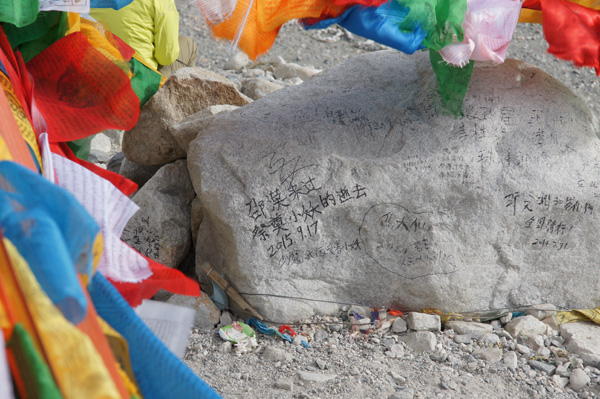 |
|
Stones at Qomolangma Base Camp in the Tibet autonomous region have been defaced by tourists. Photo by Jiang Jiahua/For China Daily] |
Dingri county said on Tuesday that it has had enough of visitors leaving their marks at the scenic spots on Qomolangma, also known as Mount Everest in the West.
The north slope of the 8,848-meter peak is in Dingri county, and Qomolangma Base Camp, at an altitude of about 5,200 meters, is the county's gateway to the mountain.
The base camp, near the border of China and Nepal in the Himalayan mountain range, is a big tourist attraction, and graffiti is common.
The four main tourism monuments that the county maintains on the mountain are always tarnished with graffiti, according to staff members at the Dingri tourism bureau.
"The graffiti includes people's names, verses and sometime paintings," said Drolma, a staff member at the bureau.
She said the bureau has started a blacklist to ensure that the names of those caught defacing the scenic spots are publicized.
"And we plan to set up several graffiti boards at the tourism spots this year," said Drolma. "We hope these will meet the graffiti needs of tourists."
According to the bureau, more than 30 staff members are employed to look after the tourism spots on Qomolangma. They are responsible for ticket checking, environmental protection work and keeping an eye on tourists.
However, there are no teams designated to fight the graffiti problem, so all staff members regularly pitch in to help get rid of the markings.
The bureau said it is sometimes difficult to dissuade tourists from writing on the monuments at scenic spots, and some tourists become abusive if stopped.
"Simply stopping people from doing it is not enough. It is important to raise people's awareness of what is correct behavior for tourists," said Drolma.
Qomolangma Base Camp received 62,000 tourists last year and brought in ticket revenue of 14 million yuan ($2.15 million). During the peak season, the camp saw 550 visitors a day, Xinhua News Agency reported.
According to the bureau, a newly built tourism center in the county is expected to be fully operational by the end of May. It will offer improved services, including medical care, food, accommodations and shopping opportunities.
